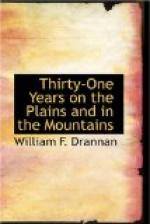I was back to Virginia City in a few days over two months from the time I had left there, and Mr. Miller proving to be a thorough salesman, we soon disposed of our entire band at a good figure, and in less than one month from the time we arrived at Virginia City we were on our way back to Oregon.
After we returned to Jacksonville we settled up and had cleared eleven hundred dollars each on the trip. That beat ranching all hollow. Now Mr. Miller proposed to me that we go into horse raising. He said he knew where there was a large tract of swamp-land near Klamath Lake. Swamp and overflown land belonged to the state, and this swamp-land could be bought for a dollar an acre by paying twenty cents an acre down and twenty per cent yearly thereafter until it was paid.
Miller being a thorough horseman, I thought I might succeed better in the horse business than in cattle. So in company with him, I started over to look at the land, and being well pleased with the tract, I made application for it at once. This land was located just on the outer edge of the Modoc Indian reservation. Miller being acquainted with all the Modocs, he and I, after I had concluded to settle, rode down to Captain Jack’s wick-i-up, which was a distance of two miles from where I proposed settling. Captain Jack was the chief of the Modoc tribe, and I found him to be a very intelligent Indian, and he made a very good stagger towards talking the English language.
When Mr. Miller introduced me to Chief Jack—or Captain Jack as he was called—and told him that I was going to be a neighbor to him, he said, “All right, that’s good, and we be friends, too.” I told him yes, and if the white men did not treat him well to let me know and I would attend to it. Jack then asked Mr. Miller where Mr. Applegate was, he being agent for the Modoc tribe, and lived in the neighborhood of Jacksonville, Oregon. Miller told him that he did not know. Jack said: “My people heap hungry and Applegate no give us anything to eat, no let us leave reservation to hunt; I don’t know what I do.”
Mr. Miller told Jack that he would see Applegate and tell him of their condition. The next morning Miller started back to Jacksonville and I remained on the land selected to be my future home.
Every few days Jack would come to my place to ask my advice as to what he should do, saying: “We no got anything to eat for three moons (three months). He tell me he come bring beef. He no come, no send beef.” Finally Jack came to my camp one day and said: “I don’t know what I do, no meat, no flour, wocus nearly all gone.”
I told Jack that I would go home with him and see for myself, not knowing but that his complaints might be without foundation. I mounted my horse, and riding over with Captain Jack, my investigation proved to a certainty that he had been telling me the truth all this time, for they were almost destitute of anything to eat, there being nothing in the entire village in the line of provisions but a little wocus, or wild rice.




